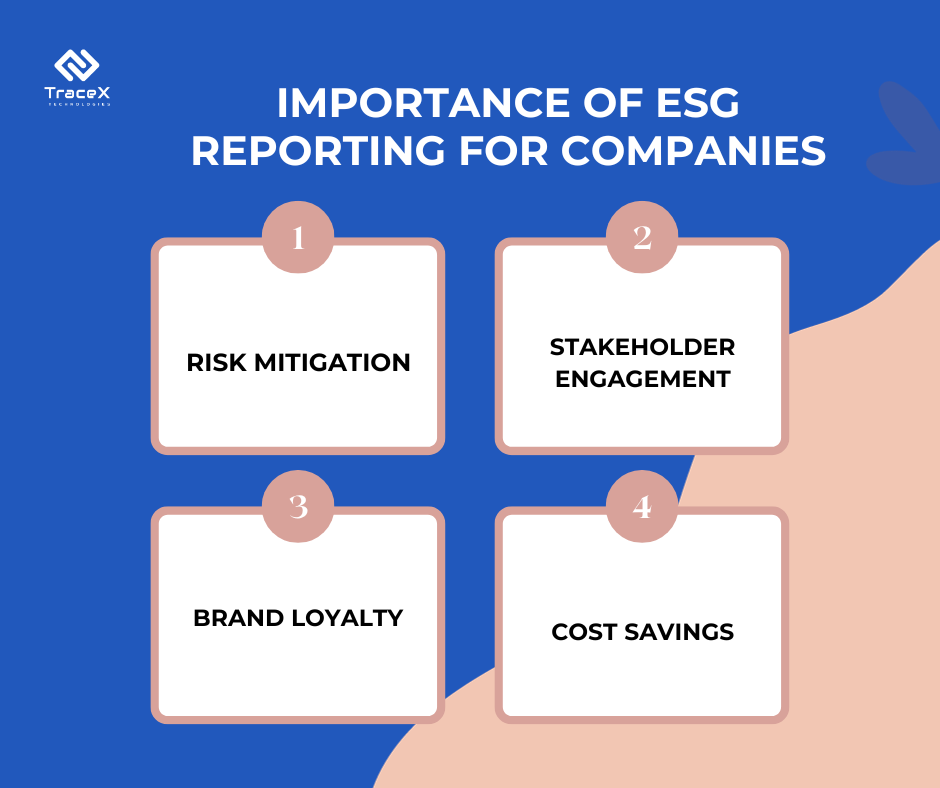Contact: +91 99725 24322 |
Menu
Menu
Quick summary: Unlock the essentials: Dive into our latest blog on what food companies need to know about ESG regulations. Explore the intricacies of Environmental, Social, and Governance compliance in the food industry, from supply chain transparency to sustainable practices. Stay ahead in the evolving landscape of responsible business with insights tailored for food companies navigating the complexities of ESG regulations.

In an era marked by heightened awareness of environmental, social, and governance (ESG) considerations, food companies find themselves at the intersection of sustainability and responsible business practices. Navigating the evolving landscape of ESG regulations is paramount for these companies as they play a crucial role in the global food supply chain. From reducing carbon footprints and ensuring ethical sourcing to prioritizing social impact, ESG regulations are reshaping the way food companies operate.
A report by Trace Grains states that while 64% of food brands deem environmental, social, and governance (ESG) compliance crucial, a notable 41% acknowledge falling short of achieving full compliance.
Our blog delves into the essentials, outlining what food companies need to know about ESG regulations. Join us in exploring the key principles, compliance challenges, and the transformative impact ESG practices can have on the food industry.
ESG (Environmental, Social, Governance) regulations are a set of standards guiding businesses to integrate sustainability and ethical practices. Environmental criteria assess a company’s impact on nature, social criteria evaluate its relationships with society, and governance criteria focus on internal controls.
Food companies face a growing importance of ESG regulations as consumers increasingly prioritize sustainable and socially responsible practices. Stakeholders demand transparency in sourcing, ethical labor practices, and environmentally conscious production. Adhering to ESG standards not only aligns businesses with societal values but also mitigates risks and enhances long-term viability in a conscientious market landscape.
The food and beverage sector is subject to a range of ESG regulations that encompass production and manufacturing, food waste, packaging, supply chain and distribution.
Food production significantly impacts the environment through deforestation, water consumption, and greenhouse gas emissions. Large-scale agriculture contributes to biodiversity loss, soil degradation, and pollution, exacerbating environmental challenges.
The carbon footprint of food, reflecting its greenhouse gas emissions, is a key concern. Sustainable practices, such as agroecology and regenerative farming, aim to minimize this impact. Adopting efficient supply chains, reducing food waste, and promoting plant-based diets are strategies to lower carbon footprints. As consumers and businesses prioritize sustainability, the food industry plays a pivotal role in mitigating environmental harm, fostering an eco-friendlier approach to nourishing the global population.
Labor practices in the food industry hold ethical implications, with concerns over fair wages, safe working conditions, and workers’ rights. Exploitative practices and inadequate labor conditions are challenges that demand industry-wide attention to ensure human rights are upheld throughout the supply chain.
Community engagement and social impact are crucial aspects of responsible food production. Food companies are increasingly expected to engage with local communities, support small farmers, and contribute positively to societal well-being. Initiatives like fair trade and community development projects not only enhance a company’s social responsibility but also foster sustainable relationships, benefiting both the business and the communities it operates in.
Corporate governance involves structuring business operations ethically, ensuring responsible decision-making, and safeguarding stakeholder interests. Ethical business practices encompass fair competition, integrity, and adherence to legal standards, shaping a company’s overall governance framework.
Transparency and accountability are foundational to corporate responsibility. Open communication about business practices, financial reporting, and environmental/social impacts builds trust with stakeholders. Accountability mechanisms, including clear policies and ethical guidelines, help hold organizations responsible for their actions. In an era where transparency is paramount, businesses that prioritize openness and accountability not only meet regulatory expectations but also establish a foundation for sustainable relationships with customers, investors, and the broader community.
Relevant ESG regulations for food companies encompass a spectrum of environmental, social, and governance standards. These may include guidelines on sustainable sourcing, waste reduction, fair labor practices, and board diversity. Compliance with these regulations is crucial for companies to demonstrate commitment to responsible business practices and meet evolving societal expectations.
Reporting requirements for ESG in the food industry often involve disclosing environmental impacts, social initiatives, and governance structures. Robust reporting mechanisms, such as sustainability reports, are increasingly common. Compliance measures involve implementing internal policies, conducting audits, and staying informed about evolving regulations. By transparently reporting and diligently adhering to compliance measures, food companies not only meet regulatory expectations but also enhance their reputation and credibility in the eyes of investors and consumers.

The landscape of food safety is undergoing a profound shift, placing increased responsibility on food producers to meet the evolving demands of consumers and comply with stringent regulations. Not only are consumers seeking detailed information about the origin and traceability of their food, but regulatory pressures, such as the Corporate Sustainability Reporting Directive (CSRD) and the Environmental and Social Responsibility (ESR) Standard in the EU, are adding layers of accountability.
Scheduled to come into effect in 2024, the CSRD is poised to impact over 50,000 companies, including numerous multinational players in the food and beverage sector. This directive mandates extensive sustainability reporting, compelling agri-food companies to disclose comprehensive information about their environmental, social, and governance practices across the entire value chain. Key areas covered include resource utilization, waste management, greenhouse gas emissions, labor conditions, and supply chain transparency.
The significance of the CSRD in the EU lies in its pivotal role in enhancing transparency within the agri-food value chain. This heightened transparency not only contributes to improved food quality and safety but also provides stakeholders with a deeper understanding of the processes involved in food production, processing, and distribution.
The availability of such detailed data empowers stakeholders to assess the sustainability performance of companies, enabling consumers to make informed choices about the products they choose. This transparency is instrumental in identifying potential risks and areas for improvement, leading to a reduction in financial losses associated with product recalls in the food chain.
Moreover, enhanced transparency facilitates better traceability, ensuring the swift identification and resolution of potential hazards. It fosters accountability throughout the supply chain, encouraging responsible practices and mitigating the likelihood of incidents related to food contamination. As the food industry braces for these regulatory changes, the emphasis on transparency becomes a cornerstone for fostering a safer, more sustainable food ecosystem.
Food companies encounter several challenges as they strive to adhere to Environmental, Social, and Governance (ESG) compliance. These challenges reflect the complex nature of the food industry and the multifaceted expectations placed upon companies to operate sustainably and responsibly.
Technology solutions play a crucial role in helping companies adhere to Environmental, Social, and Governance (ESG) compliance by providing tools and platforms that facilitate data management, analysis, and reporting.
Technology solutions enable companies to collect, aggregate, and manage vast amounts of data related to their environmental, social, and governance performance. Automated systems can streamline data collection processes, ensuring accuracy and reliability.
Advanced reporting platforms and dashboards allow companies to present their ESG performance transparently. Automated reporting systems help generate comprehensive reports aligned with various ESG frameworks and standards such as GRI (Global Reporting Initiative) or SASB (Sustainability Accounting Standards Board).
Technology solutions, including blockchain and supply chain management systems, enhance visibility into complex supply chains. This visibility is crucial for tracking and verifying sustainability practices across suppliers, ensuring compliance throughout the entire value chain.
Environmental performance is a key component of ESG compliance. Technology solutions, such as carbon accounting software and IoT (Internet of Things) devices, enable companies to accurately measure and track their carbon emissions, helping them meet reduction targets.
Technology can be employed to monitor and ensure ethical labor practices across the supply chain. This includes tools for auditing, tracking working conditions, and addressing potential human rights violations.
Technology solutions automate the monitoring of evolving ESG regulations and standards. Companies can stay informed about changes in compliance requirements and adjust their strategies accordingly to meet new obligations.
TraceX sustainability and carbon management solutions contribute significantly to helping companies adhere to ESG compliance by providing comprehensive tools for tracking, managing, and reporting on sustainability and carbon-related initiatives. Real-time monitoring of carbon emissions, facilitated by Satellite integration, ensures a dynamic understanding of environmental impact throughout the supply chain. Blockchain technology underpins supply chain transparency, offering an unassailable foundation for tracking sustainable and ethical practices across suppliers, a crucial aspect of regulatory adherence. Automated reporting, customizable dashboards, and centralized data repositories streamline the generation of comprehensive reports, addressing data accuracy and standardization challenges. TraceX further supports stakeholder engagement through communication platforms, fostering transparency in social and governance aspects.
In conclusion, the evolving landscape of Environmental, Social, and Governance (ESG) considerations presents both challenges and opportunities for food companies. Navigating complex supply chains, addressing labor practices, and meeting regulatory standards pose common challenges. However, embracing ESG principles also offers avenues for operational improvement and brand enhancement. By adopting sustainable practices, ensuring transparency, and prioritizing ethical considerations, food companies can not only comply with evolving regulations but also strengthen their resilience and reputation in a socially conscious market. As consumers increasingly value sustainability and responsible business practices, integrating ESG into operations becomes not just a regulatory requirement but a strategic imperative for long-term success in the dynamic and conscientious food industry.
